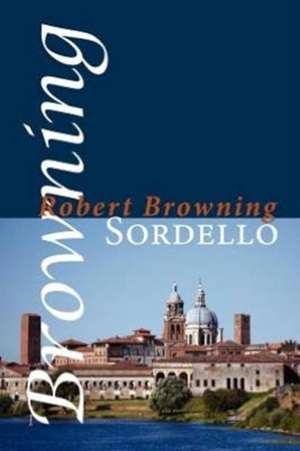Sordello: Shearsman Classics
Autor Robert Browningen Limba Engleză Paperback – 14 sep 2012
| Toate formatele și edițiile | Preț | Express |
|---|---|---|
| Paperback (3) | 61.92 lei 6-8 săpt. | |
| CREATESPACE – | 104.18 lei 3-5 săpt. | |
| CreateSpace Independent Publishing Platform – | 61.92 lei 6-8 săpt. | |
| Shearsman Books – 14 sep 2012 | 130.60 lei 6-8 săpt. |
Preț: 130.60 lei
Nou
Puncte Express: 196
Preț estimativ în valută:
24.99€ • 26.16$ • 20.68£
24.99€ • 26.16$ • 20.68£
Carte tipărită la comandă
Livrare economică 07-21 aprilie
Preluare comenzi: 021 569.72.76
Specificații
ISBN-13: 9781848612525
ISBN-10: 1848612524
Pagini: 208
Dimensiuni: 152 x 229 x 12 mm
Greutate: 0.31 kg
Ediția:Revised
Editura: Shearsman Books
Seria Shearsman Classics
ISBN-10: 1848612524
Pagini: 208
Dimensiuni: 152 x 229 x 12 mm
Greutate: 0.31 kg
Ediția:Revised
Editura: Shearsman Books
Seria Shearsman Classics
Notă biografică
Robert Browning was born on May 7, 1812, in Camberwell, London), the first -born of Robert and Sarah Browning. His mother was a Non-Conformist and an accomplished pianist. Mr. Browning senior had forgone a fortune after objecting to the slavery on the family's plantation in the West Indies. He became instead a clerk in the Bank of England. Despite his modest salary he was able to marry, raise a family, and to acquire a library of some 6000 books. Most of the poet's education came at home. He was an extremely bright child and an omnivorous reader and learned Latin, Greek, French and Italian before his mid-teens. He attended the University of London in 1828, the year it first opened (now University College London), but left after a year to continue his further education at his own pace. In the 1830s he met the actor William Macready and wrote several verse dramas, without much in the way of success. At the same time he was developing his verse syle with an emphasis on dramatic situations and character analysis. His first publication, Pauline, printed anonymously and with a subvention from his father, failed to find a single buyer. His next, Paracelsus failed also to find many readers amongst the wider public, but did create a name for him amongst the literati. His third volume, Sordello (1840) came close to ruining his reputation for good, as no-one understood what he was up to. Subsequent to this failure he further developed the dramatic monologue as his favoured form, with the narrator invariably not being the author himself, and presenting a slippery notion of reality and truth. In the mid-1840s, after having read and admired the work of Elizabeth Barrett (1806-1861), he arranged to meet her. She was a semi-invalid and lived under the thumb of a domineering father, who forbade any of his children to marry. Despite this, the two fell in love, and eloped, living in Italy - mostly in Florence - until Elizabeth's death. While they were together, Elisabeth was much the better-known poet, but Robert began to develop his own public from the mid-1850s onwards and became lionised after his return to London, following the death of his wife. His ascent into the living pantheon was achieved with the monumental verse-novel The Ring and the Book (1868-9), and his reputation continued to remain high until his death, despite some of his later books not finding favour - Browning continued to push the boundaries of taste, and could upset the genteel Victorian reading public with works such as Red Cotton Night-Cap Country (a dismal title for what is in fact another interesting verse novel). His last book, Asolando, appeared on the day he died and went through fourteen editions - a contrast to Sordello, which only sold some 150 copies in its first 15 years.













